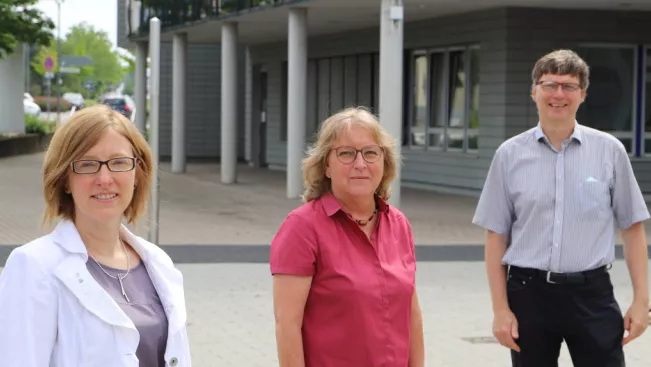Communications and Marketing
Graduate Institute celebrates 10th anniversary

At a small barbecue party, teachers, doctoral students and companions of the Graduate Institute met at the Sankt Augustin campus to honour the success of the past decade and to make plans for the future.
At the time, the GI had entered uncharted territory: For although academic qualifications at Universities of Applied Science are comparable to those of traditional universities, for a long time a doctorate was associated with considerable difficulties for its Master's graduates. Prof. Dr Rainer Herpers, Scientific Director of the Graduate Institute, recalls: "Application-oriented research has always been part of our self-image. However, it was not possible for us to honour outstanding research achievements made at our institute by awarding a doctorate, and this could only be done in cooperation with a university." The competitive disadvantages in the further qualification of young academics often led to particularly qualified students and young researchers migrating to universities, private universities or abroad for a doctorate. Now that the North Rhine-Westphalia State Parliament has paved the way for a separate right to award doctorates at the NRW Doctoral College with the current Higher Education Act, the review by the Science and Humanities Council is due soon.
University President Hartmut Ihne: "The acquisition of the right to award doctorates by the NRW Doctoral College would be an important step we have been fighting for a long time. It ensures the promotion of young academics and the further development of research at universities of applied sciences as well as strengthening NRW as a science location."
A big step forward for universities of applied sciences in NRW
Statistics show how popular the H-BRS has become among doctoral students: More than 100 PhD students are currently working on their dissertations at H-BRS, and 15 doctoral projects have been successfully completed in 2020. Most of the doctoral students belong to the departments of Applied Natural Sciences or Computer Science, but a doctorate at H-BRS is possible in all departments. The Graduate Institute promotes young researchers and makes their research projects visible both inside and outside the university.
When it was founded, the Graduate Institute was the first institution of its kind at a UAS. Its interdisciplinary orientation filled a gap: "Doctorates are not organised centrally by the university, but are supervised by the departments and research institutes. The GI offers its members a platform they can use for networking and interdisciplinary exchange as well as for further professional and interdisciplinary qualification," explains Prof. Herpers.
The GI enables participation, co-determination and offers help
The basis of the GI is the General Assembly, in which all members - i.e. professors who supervise current doctoral projects as well as the PhD students themselves - can constructively participate. Additionally, the GI provides organisational support for PhD students. Special training courses deal with ethical issues, time management or presentation techniques, for example.
Last but not least, the Graduate Institute also helps financially. Scholarships make it possible for young researchers to realise their doctoral project regardless of their family income or current job. This also includes responding to current circumstances: After setting up a Corona scholarship for delays caused by the pandemic last year, there will also be financial aid for those affected by the flood disaster in Rhineland-Palatinate and North Rhine-Westphalia in the coming months.
Over the years, the Graduate Institute has become a model for initiatives in other federal states, and Rainer Herpers even travels to other European countries to give lectures on the GI concept. Besides all the political success, however, it is above all the work with and for the doctoral students that leaves its mark. From lone fighters, the Graduate Institute has formed a community that presents and experiences itself as a group within the university.